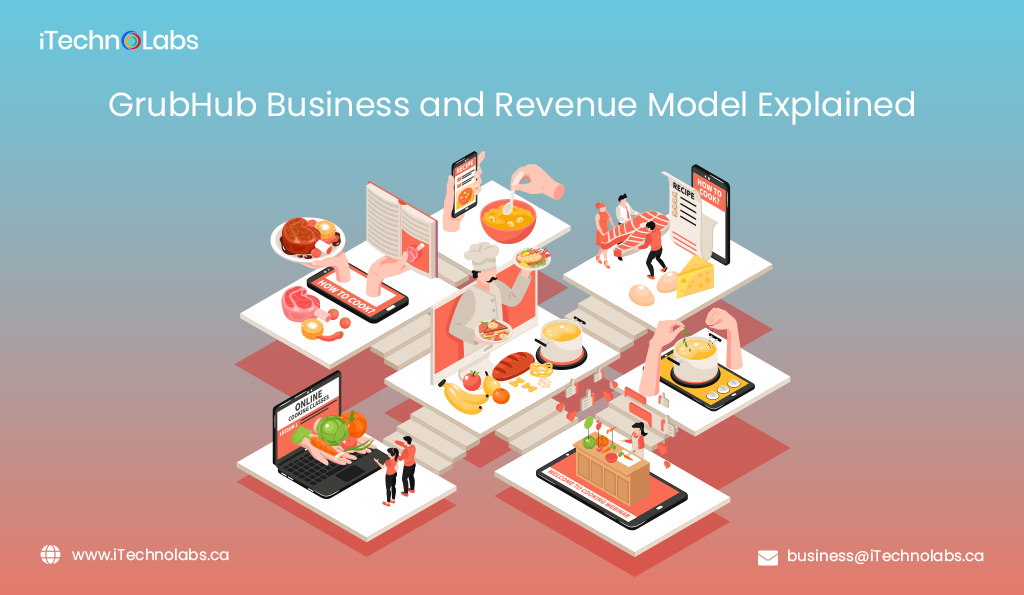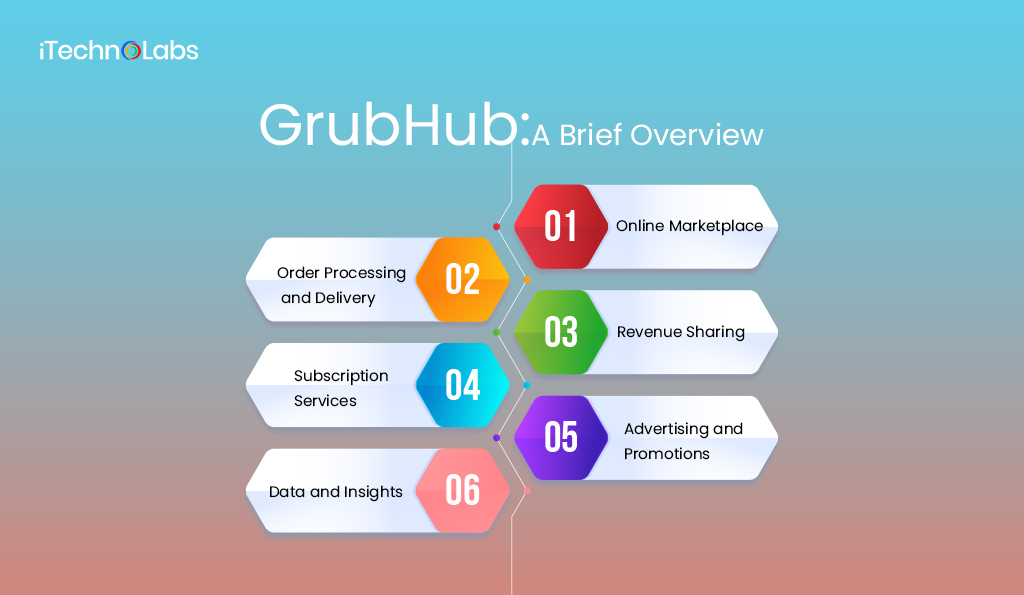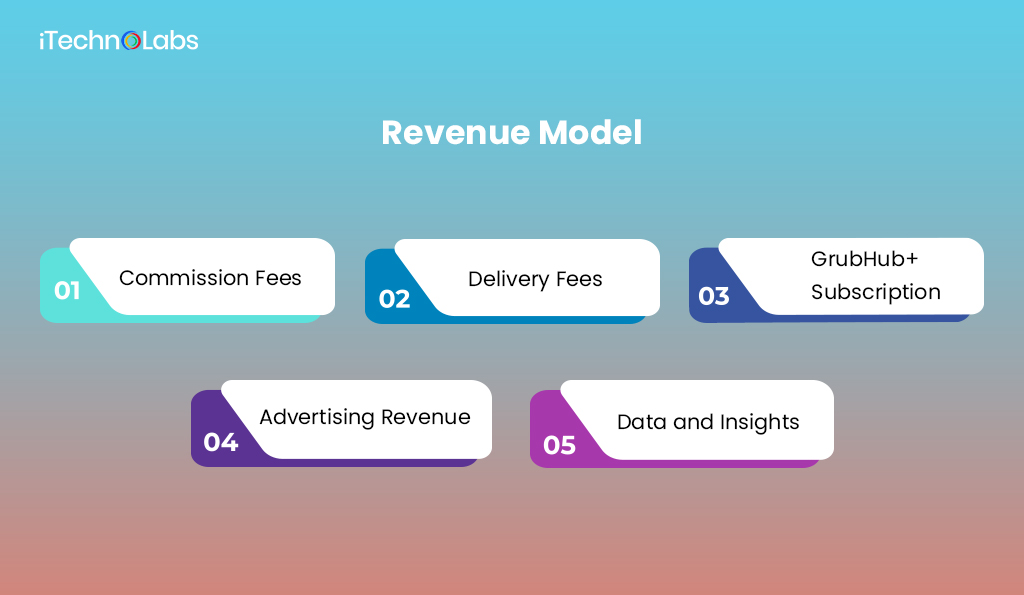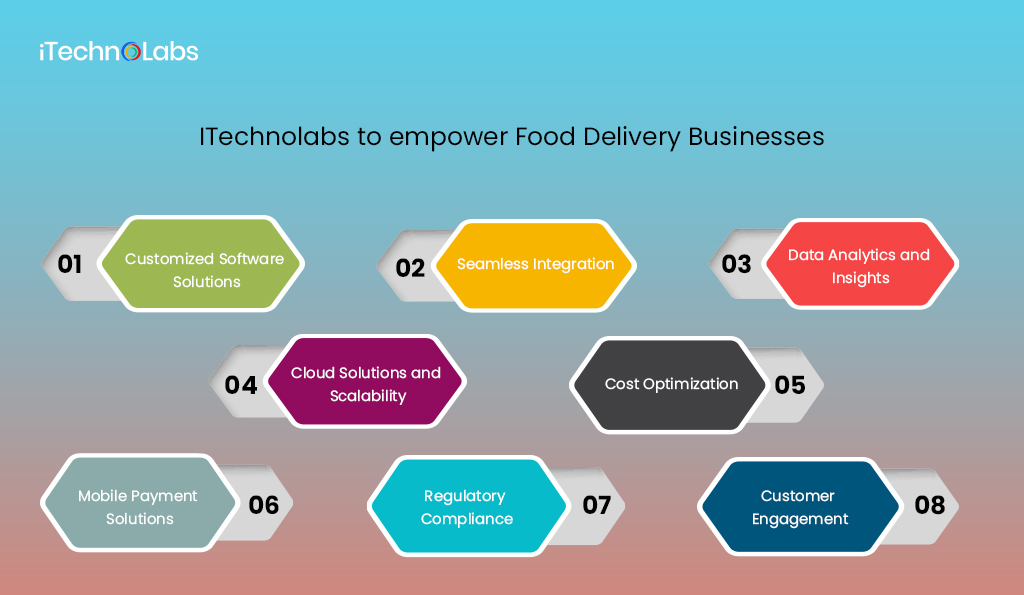Last updated on December 28th, 2023
In the constantly evolving market of food delivery services, GrubHub has emerged as one of the major players that connect hungry patrons with a variety of eateries. This article focuses on GrubHub’s revenue model and business and provides insight into how it functions and generates revenues. We’ll also explore ways a technologically-savvy partner such as iTechnolabs can help companies in enhancing their food delivery systems.
GrubHub: A Brief Overview
GrubHub was established on the 4th of April 2004 with the help of Matt Maloney and Mike Evans and has since grown into one of the top on-demand and mobile delivery services across the United States. The platform connects customers to local eateries and provides the convenience of ordering food delivery or takeaway.
Business Model Overview
GrubHub’s business model is based on acting as a mediator between restaurant patrons and their customers. Here’s the main elements in their strategic business plan:
1. Online Marketplace:
GrubHub is an online marketplace which lists numerous restaurants, along with their menus. Users can browse the vast list of restaurants, look up menus, and order on the web or via the GrubHub application. The marketplace eases the process of finding the local eateries.
2. Order Processing and Delivery:
When customers make orders on the GrubHub platform GrubHub handles the whole ordering process. This includes delivering an order directly to restaurants, processing the payment and coordinating the collection or delivery. In certain instances, GrubHub also offers its own delivery service via GrubHub drivers, or through partnerships with delivery companies from third parties.
3. Revenue Sharing:
GrubHub earns money by charging restaurants a fee on every order that is placed on the website. The commission may vary according to a number of variables including the kind of restaurant, the area, and the quality of service offered through GrubHub (e.g. the delivery process). In addition, GrubHub may charge delivery costs to customers depending on the location and restaurant.
4. Subscription Services:
GrubHub provides a subscription service known as “GrubHub+,” which offers customers benefits like unlimited delivery for free and discounts that are exclusive. Members pay a monthly charge to enjoy these perks and contribute to GrubHub’s regular revenue stream.
5. Advertising and Promotions:
To make its platform more profitable, GrubHub offers advertising and promotional opportunities for restaurants. Restaurants are able to pay for prominent placement in the app, which increases their exposure to potential customers. These fees for advertising add to GrubHub’s revenues.
6. Data and Insights:
GrubHub gathers important data about preferences of customers, habits of ordering and the performance of restaurants. They might provide access to these data and information to restaurant partners in exchange for an amount, allowing restaurants to improve prices, menus as well as marketing plans.
Revenue Model
GrubHub’s revenue model is centered around delivery fees, commissions and subscription service. This is a more in-depth analysis of the ways GrubHub earns its income:
1. Commission Fees:
The basis of the revenue model used by GrubHub is the commission fee that is paid to restaurants for every order made through the platform. This can be anywhere from 10 to 30 percent or more of the total amount of the order, depending on a variety of factors. It’s a proportion of the restaurant’s profits generated by GrubHub.
2. Delivery Fees:
GrubHub can charge customers delivery charges for certain orders, specifically when they use the delivery driver’s own or delivery partners from third parties. These charges contribute to their revenue streams.
3. GrubHub+ Subscription:
Its GrubHub+ services for subscriptions can provide additional income. Customers pay a monthly subscription fee to enjoy benefits such as free delivery and discounts, resulting in an income stream that is steady.
4. Advertising Revenue:
GrubHub is able to earn revenue from restaurants that pay prominent placements and promotions through the platform. Advertising fees make up an important portion of the company’s earnings.
5. Data and Insights:
Although not the main income source, GrubHub may charge restaurants for access to information and insight that can be used to enhance their services and operations.
Challenges and Competitive Landscape
Although GrubHub has seen significant growth, it is facing a variety of issues in the highly competitive market for food delivery. The competition from companies such as DoorDash, Uber Eats, and Postmates (which was bought by Uber) implies that GrubHub has to constantly develop and innovate to keep its share of the pie. Furthermore the food delivery industry has been criticized for the cost of commissions and conditions for workers that have led to legal challenges.
iTechnolabs to empower Food Delivery Businesses
iTechnolabs is a tech-oriented company which specializes in software development, app development, as well as IT consultancy. Within the food delivery sector, iTechnolabs can play a crucial part in helping businesses to improve their efficiency and profits.
1. Customized Software Solutions:
iTechnolabs can create customized software solutions that are tailored to the particular needs of food delivery companies. This includes creating user-friendly websites and mobile apps which streamline ordering and improve the customer experience and increase brand recognition.
2. Seamless Integration:
Integration is essential to food delivery services. iTechnolabs will help companies integrate their systems with a variety of third-party applications, including payment gateways, map, and tracking systems for orders. This will ensure a smooth, efficient and smooth operation.
3. Data Analytics and Insights:
Understanding the behavior and preferences of customers is essential to achieving success in the food delivery business. iTechnolabs can help businesses with setting up powerful data analytics tools that collect valuable information. These insights could help in menu optimization pricing strategies, menu design, and marketing strategies.
4. Cloud Solutions and Scalability:
Scalability is essential for companies looking for expansion. iTechnolabs has cloud-based solutions that let businesses expand their operations effectively and ensure they are able to handle increasing order volumes without compromising performance.
5. Cost Optimization:
Reduced operational expenses are essential to increase profitability. iTechnolabs can evaluate a company’s processes and technology stacks to determine areas where cost savings could be made without compromising the quality of service or satisfaction of customers.
6. Mobile Payment Solutions:
With the rising demand for mobile payment, iTechnolabs can develop secure and user-friendly mobile payment services providing customers with a convenient and efficient method to pay for their purchases.
7. Regulatory Compliance:
In the face of a complex regulatory environment, navigating in the field of food delivery can be a challenge. iTechnolabs will help companies stay fully compliant with both national and local regulations, while minimizing the risk of legal problems.
8. Customer Engagement:
Engaging and retaining customers is essential to long-term success. iTechnolabs assists businesses in creating customer loyalty programmes, mechanisms for feedback and marketing automation that keeps customers returning.
Are You Looking for Similar GrubHub Business and Revenue Model from experts ?
GrubHub’s revenue model and business model have brought it into the forefront in the delivery of food business. However, the marketplace is always changing, and companies operating in this field must constantly change and evolve to stay ahead of the curve.
iTechnolabs has the experience in the field of technology solutions, is a great supplier to food delivery companies looking to improve their operations, enhance their customer experiences, and remain ahead of the pack. With the help of iTechnolabs that allow businesses to address the issues facing the sector while taking advantage of the opportunities for growth, eventually being successful in the fast-paced market in food service delivery.














